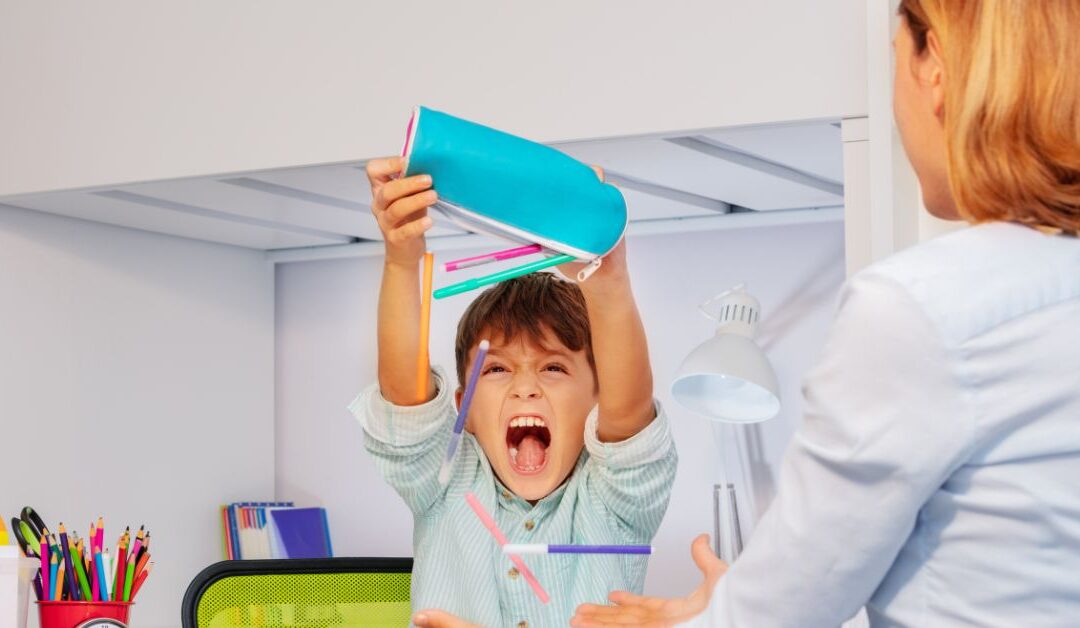For some autistic individuals, including children, they can become aggressive in certain situations. But what causes that aggression and how can you as a parent or caregiver prevent this behavior or manage it better your autistic child becomes aggressive? It’s important to reduce the risk of your child harming themselves or others, including you.
How do you define “aggression”?
First, let’s define aggression. According to the American Psychological Association’s (APA) dictionary, aggression is “behavior aimed at harming others physically or psychologically. It can be distinguished from anger in that anger is oriented at overcoming the target but not necessarily through harm or destruction.”
From an emotional perspective, the APA dictionary notes “affective aggression involves an emotional response that tends to be targeted toward the perceived source of the distress but may be displaced onto other people or objects if the disturbing agent cannot be attacked.”
From what I’ve seen, when autistic people become aggressive, it’s more related to “affective aggression” rather than hostile aggression, which is “when such behavior is purposively performed with the primary goal of intentional injury or destruction” (APA Dictionary).
Is aggression more prevalent in autistic children?
According to SPARK (Simons Powering Autism Research), they have found in their research that autistic children can tend to have more aggressive behavior. However, being aggressive is not a trait or sign of autism.
On their website, they note, “Aggression, such as hitting, biting, scratching, hair-pulling, or kicking another person, is relatively common in children on the autism spectrum. A study of children and teenagers with autism found that 68 percent had been aggressive to a caregiver, and 49 percent had been aggressive to someone else, at some point. More than half of the youth studied were currently having mild to severe aggressive behavior.”
They also stated, “In the general population, young children often become less aggressive as they get older and learn better ways to express themselves. But for some with autism, aggression persists through the teen years into adulthood. One study found that 15 to 18 percent of adults who have autism and intellectual disability showed aggression. Another study of autistic adults found that 5 percent of women and 14 percent of men had aggressive behavior over time.”
What causes aggression in some autistic children?

So what could be causing aggressive behavior in your autistic child? There are a few consistent reasons why autistic children and teens could become aggressive:
- For children who are non-verbal or have difficulty communicating, aggression is a way for them to communicate their needs or their dislike for something.
- Sometimes, aggressive behavior comes not from the autism but from depression, anxiety or other mental health problems or conditions during an emotional breakdown. Some autistic people have these conditions in addition to autism. (Research has shown that aggression is more linked to psychiatric conditions rather than autism.)
- Aggression can be a result of sleep issues and inattention.
- Some autistic people tend to dwell on negative feelings and thoughts, and they may renumerate those in their head and verbally. This could lead to aggressive behavior.
Our son J has aggressive behavior occasionally, but we believe it’s more related to his depression than autism. While I won’t share details because they are too personal to him, I will say from a parent perspective, it’s so hard to go through these times. Our first concern is that he doesn’t harm himself or one of us. We try our best to de-escalate his emotions and help him gain control of them. For parents who go through this continually with their child, teen or young adult, I understand just how devastating and life changing it can be for them.
What are the signs my autistic child may become aggressive?
So what signs or triggers should you be looking for that could result in your child having an episode of aggressive behavior?
- If your child’s routine or ritual is interrupted, that could result in some aggressive behavior because your child is unhappy about it and wants to continue the routine they prefer.
- Your child or teen may show aggression if they are upset and lose control of their emotions.
- They could become aggressive if they are experiencing high anxiety in a situation.
- Your child may have aggressive behavior if they are angry and have difficulty expressing their anger verbally.
- They may become aggressive if they are frustrated over a problem they cannot solve.
- Your teen or child may feel aggression if they have sensory issues that are bothering them and cannot relieve the overwhelm from them.
What should I do when my child becomes aggressive?
Ideally, the best way to handle aggression is to try to avoid triggers that can cause it to begin. That could include:
- Allowing your child to stick to their routines as much as possible. If you need to change them, give your child plenty of notice and talk about the reasons why they have to change. You can also offer some type of reward if they handle the change well.
- Providing therapy or other services to help your child improve their communication and social skills.
- Teaching your child how to identify and name their emotions along with coping skills such as deep breathing and other ways to calm themselves if they feel like they are losing control.
- Identifying a safe place for your child at home, school and other places where they can go to calm down if they feel overwhelmed.
- Offering a pillow or punching bag to hit or kick if your child is angry can help them alleviate their aggression in a way that won’t hurt themselves or others.
- Talking to your child’s doctor if the aggression is extreme to determine if there are treatments that may be beneficial to your child that you have not already tried or considered.
What should you do if your autistic child or teen is in crisis?
As our children get older, they are bigger and harder to manage if they are very aggressive. In those cases, their behavior can become extreme and put themselves and you in danger. If that happens, you can call 988 or 211 for help, anywhere in the United States.
988 is the national suicide hotline and mental health crisis lifeline number from Mental Health America. When you call, counselors can help you through a mental health emergency. Their website notes you can “call or text 988 or chat 988lifeline.org. You can also reach Crisis Text Line by texting MHA to 741741.”
211 is a resource hotline from the United Way available in most states. Their website notes “if you need assistance locating long-term mental health resources, talking through a problem, or exploring mental health treatment options, call 211 to speak with a live person who can help.”
If your situation is an emergency in which you or your child is in imminent danger, you should call 911 for immediate assistance. You can explain your situation and that your child or teen has autism. Also be sure to ask if they have a mental health counselor or other person who can help with assisting first responders. More first responder agencies are making them available.
Additional resources
If you need more information to dive deeper into this topic, take a look at some of these resources available.
People with Autism Behaving Badly: Helping People with ASD Move On from Behavioral and Emotional Challenges (affiliate link)
No Fighting, No Biting, No Screaming: How to Make Behaving Positively Possible for People with Autism and Other Developmental Disabilities (affiliate link)
15-Minute Focus: Anger, Rage, and Aggression (affiliate link)
Breathing Exercise Cards for Kids: Calm and Focus (affiliate link)
The Anger Workbook for Teens: Activities to Help You Deal with Anger and Frustration (affiliate link)
What has worked for your autistic child if they become aggressive? Leave a comment to share and encourage one another along this journey.








